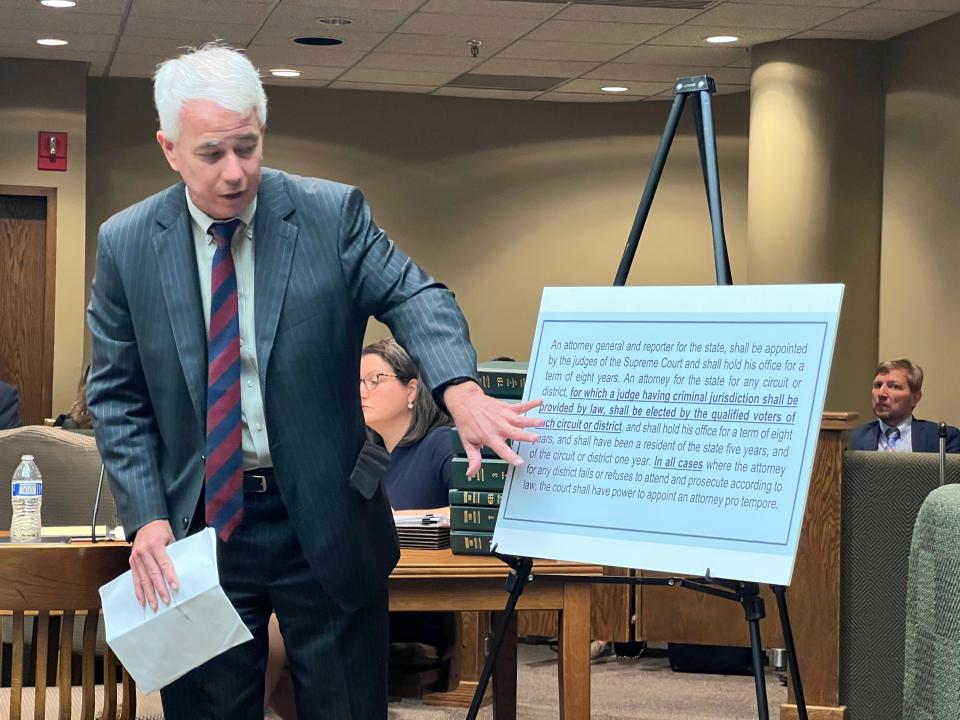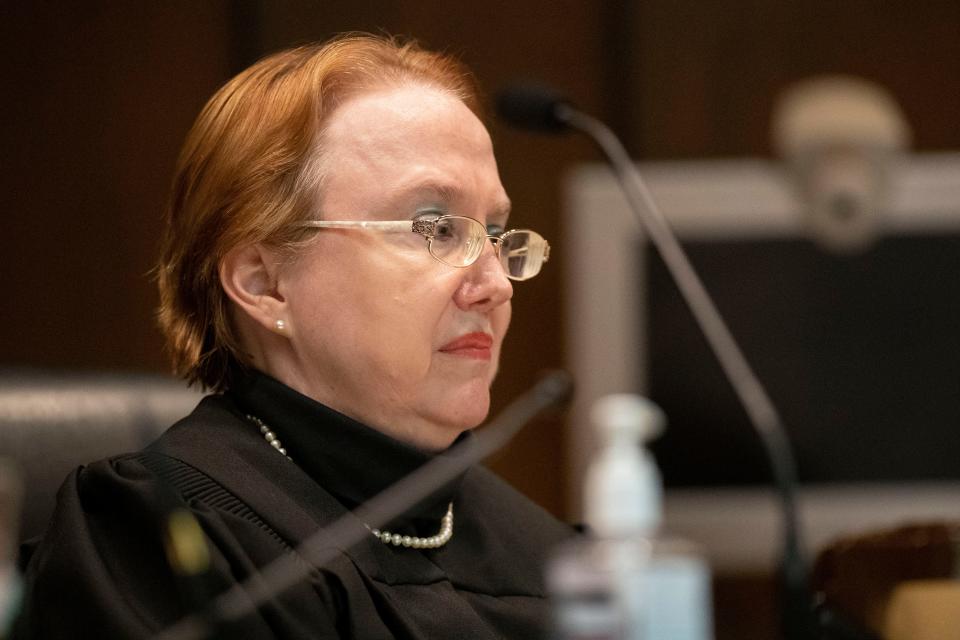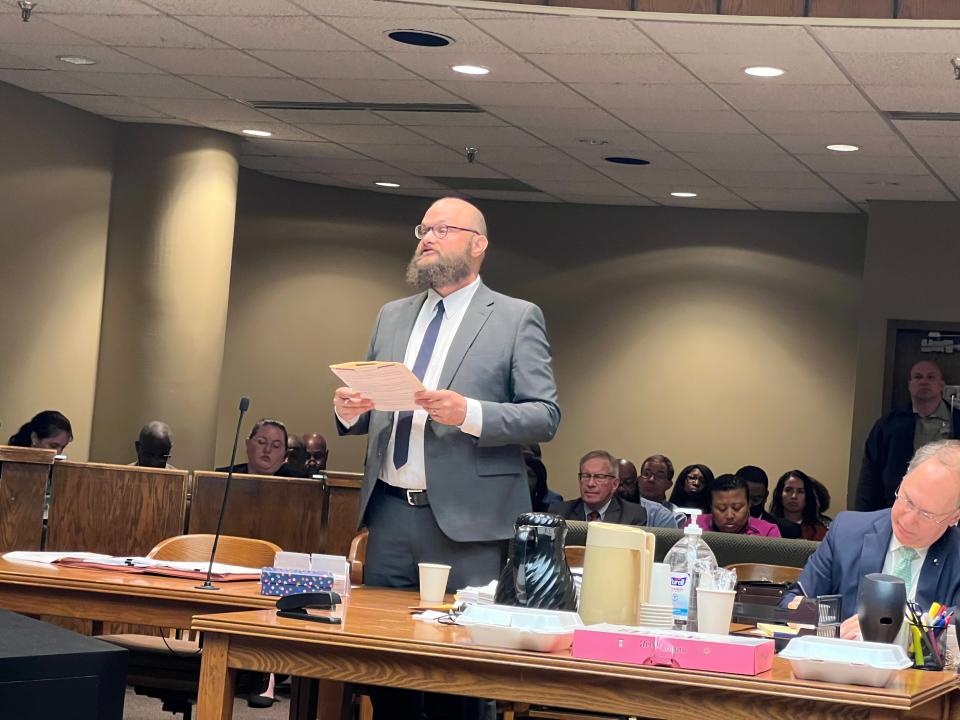Shelby Co. judge says Tennessee attorney general can appeal death penalty review ruling

- Oops!Something went wrong.Please try again later.
The Tennessee Attorney General's Office will be allowed to appeal Shelby County Criminal Court Judge Paula Skahan's ruling that a newly enacted state law unconstitutionally strips power from elected district attorneys.
The law, which Skahan ruled unconstitutional on July 17, gives the state attorney general the power to prosecute collateral reviews ― reviews for errors in trials or sentencings ― of death penalty convictions. Those cases begin when a defense attorney files a petition of coram nobis, which is typically filed after other avenues for appeal have been exhausted.
Shelby County District Attorney Steve Mulroy and Memphis defense attorney Robert Hutton argued against the law saying it violated people's voting rights, that the Tennessee General Assembly did not give proper notice to the public about the law and that it wrongfully removed jurisdiction from district attorneys.
Skahan did not rule on the voting rights issue but ruled in favor of Mulroy and Hutton in the other two areas. Laws are ruled unconstitutional if a judge rules in favor of a single prong of an argument.
In her reasoning for granting the appeal, Skahan cited potential harm for all parties by prolonging the case, preventing expenses from the attorney general having to argue similar cases and preventing potentially conflicting rulings from happening.

"Currently, these same issues are pending or are likely to be pending soon before various trial courts throughout the state in eighteen other cases," Skahan wrote. "Given the absence of controlling authority, there is a substantial risk of inconsistent opinions on these questions throughout the state."
The motion to challenge the law was originally filed by Hutton— who is representing Larry McKay, a man who is currently facing the death penalty.
Issues of standing ruled on
Skahan's ruling certified two questions for appeal. The first, which all three parties requested, is whether her ruling correctly found that the attorney general being assigned collateral review cases violates the Tennessee Constitution. The second, which was requested by Mulroy and Hutton, is if the AG should be disqualified for the Tennessee General Assembly not providing adequate notice when amending the bill.
Although all three parties in the case agreed that an appeal should be granted, the attorney general argued that Hutton did not have standing to file to disqualify the attorney general from the case. Skahan, in her ruling, agreed with Mulroy and Hutton's arguments that the standing issue could be disregarded.

"For the reasons set forth in DA Mulroy's and McKay's pleadings, the court finds that the issue of standing is moot," Skahan wrote. "The AG has specifically conceded DA Mulroy's standing to move for disqualification in his written submissions and in open court. The AG has affirmatively waived and knowingly forfeited any challenge to DA Mulroy's right to move for disqualification. DA Mulroy is a proper party and appellee in this cause, thus McKay's standing is utterly irrelevant."
Skahan also confirmed her order for a stay in the McKay case while the appeal is pending.
Her ruling was entered Tuesday, and the attorney general will have ten days to file the appeal, which the office has repeatedly indicated its intent to do, with the Tennessee Criminal Court of Appeals.
The law was initially introduced as a bill to tackle rape kit backlogs but was changed to assign collateral review cases to the state attorney general. Mulroy and Hutton both argued that the law takes away autonomy from elected district attorneys and gives them to the unelected attorney general.

Tennessee State House Minority Leader Rep. William Lambert, R-Portland, initially sponsored the legislation in the House and State Sen. Brent Taylor, R-Memphis, later joined as Senate sponsor.
Opponents of the bill, like State Sen. Raumesh Akbari, D-Memphis, called it a “waste of resources and unconstitutional” on the Senate floor. Tennessee Democrats argued the attorney general's office was overstepping to wrest control from district attorney’s offices.
Local death penalty cases: Shelby County DA seeking death penalty for man accused of killing Eliza Fletcher
The bill was signed into law on April 28, and Hutton — who is representing Larry McKay, a man who is currently facing the death penalty — filed the original motion the following Monday. Mulroy signed onto the motion the same day.
Hutton had filed a petition for coram nobis on March 30, saying that new evidence in McKay's murder case from the 1980s could have changed the outcome of that original case.
Lucas Finton is a criminal justice reporter with The Commercial Appeal. He can be reached at Lucas.Finton@commercialappeal.com and followed on Twitter @LucasFinton.
This article originally appeared on Memphis Commercial Appeal: TN attorney general OK to appeal death penalty law constitutionality

